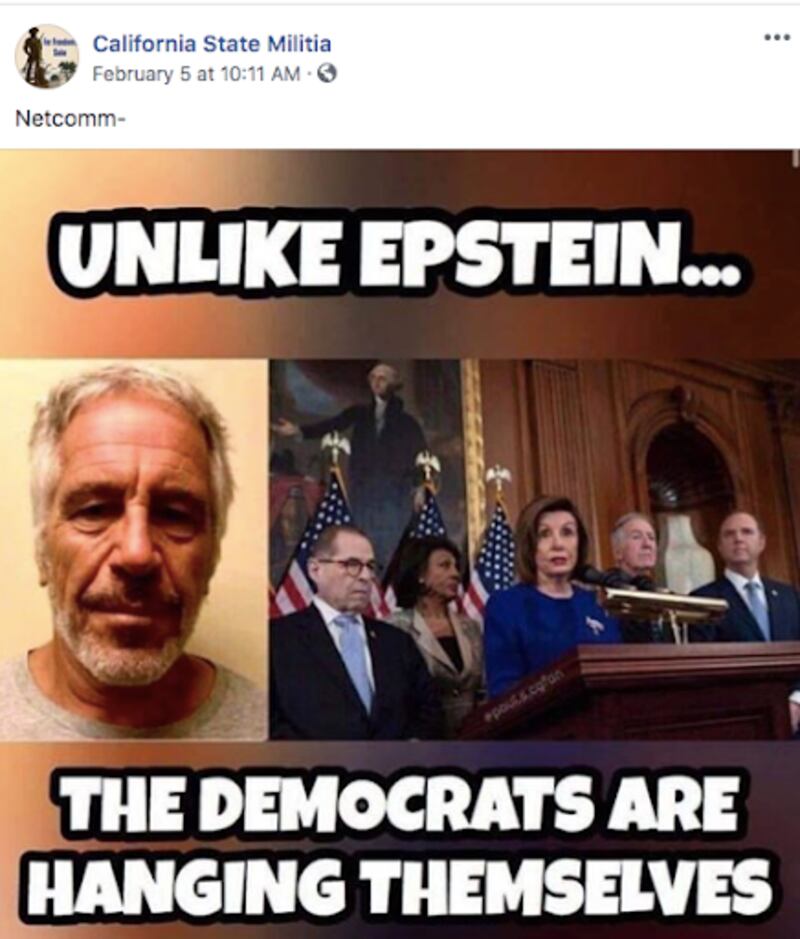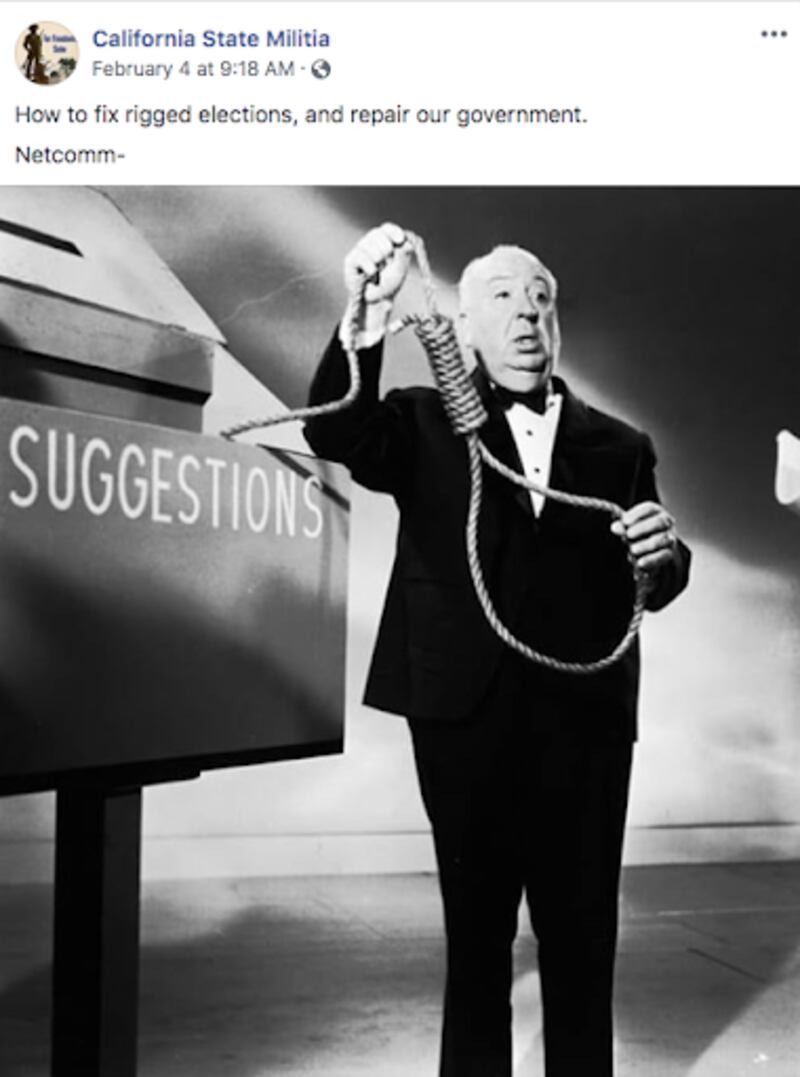Richard Chiavetta was used to having guns pointed at him before he joined a militia. His non-profit work with Los Angeles youth in gangs prepared him for teaching militia recruits how to handle firearms as they go through training.
A year ago Chiavetta, started reforming the Southern California militia, known as “Charlie Company,” under the umbrella organization of the California State Militia.
“The first few weeks was just me, alone, in pizza places around Southern California talking to a small handful of people who wanted to get involved,” he says, sipping black coffee in a black knit beanie and a matching black cotton hoodie at a café near his home in downtown Los Angeles, “I have to say, it was awkward.”
Today, he organizes people who live within the 250 miles of land from Bakersfield to the California-Mexico border. The group has about a dozen active members and 200 inactive members.
Chiavetta, 49, strikes you as more Seattle coffee shop than burly military recruit. He received a bachelor’s in literature and philosophy and a master’s in humanities from SUNY Buffalo. He’s back in school studying to become an emergency medical technician (EMT). He also has no illusions about how some view militias.
“The biggest misconception is that everyone’s a racist,” says Chiavetta. He boasts that “Charlie” is a racially diverse group with members who are Latino, African American and female– and with various political affiliations.
California militia leadership say they work to keep their formations safe and welcoming. Turning away potential recruits is rare, but not unheard of. Those who advocate violence are banned, says Chiavetta, recalling a letter he received from a young man interested in the group. When he did a background check on his social media profile he found Nazi symbols and ideology. Chiavetta informed him he wouldn’t be moving forward with his application. Then, at a meet and greet for “Delta,” the Central California militia branch, a man sat next to First Lieutenant Craig Krstolic to explain he was interested in the militia to learn bomb making to “get our point across.” Krstolic reported him to the local authorities and the FBI.
“No one of us wants to be responsible for training or working with the next school, church, mass or ideologically motivated shooter,” says Chiavetta.
The Merriam-Webster definition of a militia is “a body of citizens organized by military service.” “Charlie” defines itself as a constitutional militia. This means they’re dedicated to defending the Constitution “from all enemies, be they foreign or domestic.”
So, what would cause an uprising?
“When the state is either unable or unwilling to respond to the needs of the citizenry,” he says in an interview. “It's more likely to be a situation in which these sorts of safeguards break down, whether it’s civil unrest, a natural disaster or a terrorist attack.”
Chiavetta, a 13-year L.A. resident, grew up in suburban western New York in a working class Italian American family. His mother was a hair stylist and his father, a truck driver. Chiavetta says his father projected “a healthy distrust of the government’s intentions toward the working man.” His family members were gun owners but didn’t train or practice like he does today.
“Really, there is little in family history that laid the foundation for the work I currently do with the militia,” says Chiavetta.
His interest in the militia began with seeing rising political tensions in the U.S. after the Las Vegas shooting in 2017 that left 58 dead and more than 400 wounded.
Formations often reflect the ideology of its leadership. Chiavetta says he believes “Charlie” is more of a peacekeeping force as opposed to an insurrectionist one against the government and therefore, its military.
“I’m not like, smash the state,” he says. “But, hey, if we could all do for ourselves and not have someone in this top-down structure doing for us or telling us what to do that would be awesome.”
“Delta” is the sister branch to Southern Calif.’s “Charlie.” This branch oversees new recruits before they take on any leadership role. It approved Chiavetta to begin reforming the L.A.-based organization. Similar to “Charlie,” “Delta” also distances itself from a coup-like militia philosophy. Both militias focus their training on disaster response for earthquakes and wildfires — something unique to California. In “Delta,” militia work is a family affair. Spouses and children are encouraged to participate in training.
“I’ve got my three kids here with me now,” Krstolic says in a joint phone interview with “Delta” Captain Brian Lloyd while wrapping up a 2-day training in San Leandro about an hour from San Francisco. “It’s about community and family, not about overthrowing the government.”
“I want everyone’s significant other to be comfortable with us because if there was some sort of pandemic and I had to put my child in someone else’s care I want to know that I can trust them,” says Lloyd, who brought along his 11-year-old daughter.
The array of gear and weapons brandished by its members, however, is plentiful. The basics for “Charlie” are a standard uniform and protective amour, multiple firearms, including semi-automatic rifles like AR-15s, first aid and other survival gear like fire starters and rope.
As much as the two factions vow to be apolitical and peace-promoting, the CSM Facebook page suggests otherwise. It’s administered by leaders of the organization and Chiavetta made clear he does not post to it. The page has memes showing Jeffrey Epstein and members of the Democratic Party with the caption, “Unlike Epstein... The Democrats are hanging themselves,” and posted another with Alfred Hitchcock holding a noose captioned “How to fix a rigged election, and repair our government,” one day after the Iowa caucuses.


Militias vary, but a fondness for guns and gun rights is a through-line in each of them. Members, Chiavetta included, are usually involved with the National Rifle Association. Some even participate in gun rights lobbying.
With mass shootings on the rise in the U.S., gun control has become an urgent and deeply partisan issue, with conservatives being generally pro-guns and liberals anti-guns. Most Democratic lawmakers support stronger gun restrictions and Republican lawmakers oppose it. However, a recent study by Pew Research Center shows support for stricter gun laws has increased to include the majority of Americans.
Asked about the consensus on guns in militias, Chiavetta doesn’t hesitate.
“The Second Amendment shall not be infringed, period,” he says, twice.
Thousands of gun rights activists including armed militia members marched in Virginia in January after Democratic Gov. Ralph Northam introduced three bills addressing red flag laws, limits on handgun purchases and a weapons ban at certain public events.
Chiavetta says he responded to around 150 information requests about the company in the two weeks leading up the rally, mostly sparked by fears of increased gun control.
Which party is in power influences interest in militia work as well, he says.
“When there is a Democratic president, interest in the militia increases and the inverse is true when there is a Republican president, but recently, the attention that pro-Second Amendment movements have received in Virginia has driven a new uptick in Charlie.”
Three days before the rally President Donald Trump tweeted his support.
Your 2nd Amendment is under very serious attack in the Great Commonwealth of Virginia. That’s what happens when you vote for Democrats, they will take your guns away. Republicans will win Virginia in 2020. Thank you Dems!
— Donald J. Trump (@realDonaldTrump) January 17, 2020
For Chiavetta though, militia work is less politically motivated and more of a civic calling.
“It’s not something you do halfheartedly,” he says. “It’s something you do because you have pretty strong beliefs and a strong willingness to contribute and that doesn’t go away.”
Correction made at 11:40 a.m.: A previous version of the story stated AR-15′s as high capacity magazines. They have since been identified as semi-automatic rifles.
This story was reported and written through a journalism course on politics and government affairs reporting, and edited by USC Annenberg Professor Christina Bellantoni. Annenberg Media student editors reviewed the story and published it per newsroom guidelines.
Annenberg Media is a student-led multiplatform news media overseen and funded by the USC Annenberg School for Communication and Journalism. Many of the journalists are working weekly shifts in its newsroom, known as the Media Center, to fulfill curricular requirements. Annenberg Media is independent of the university administration. Please direct news tips and press releases to mediacentereditors@gmail.com
